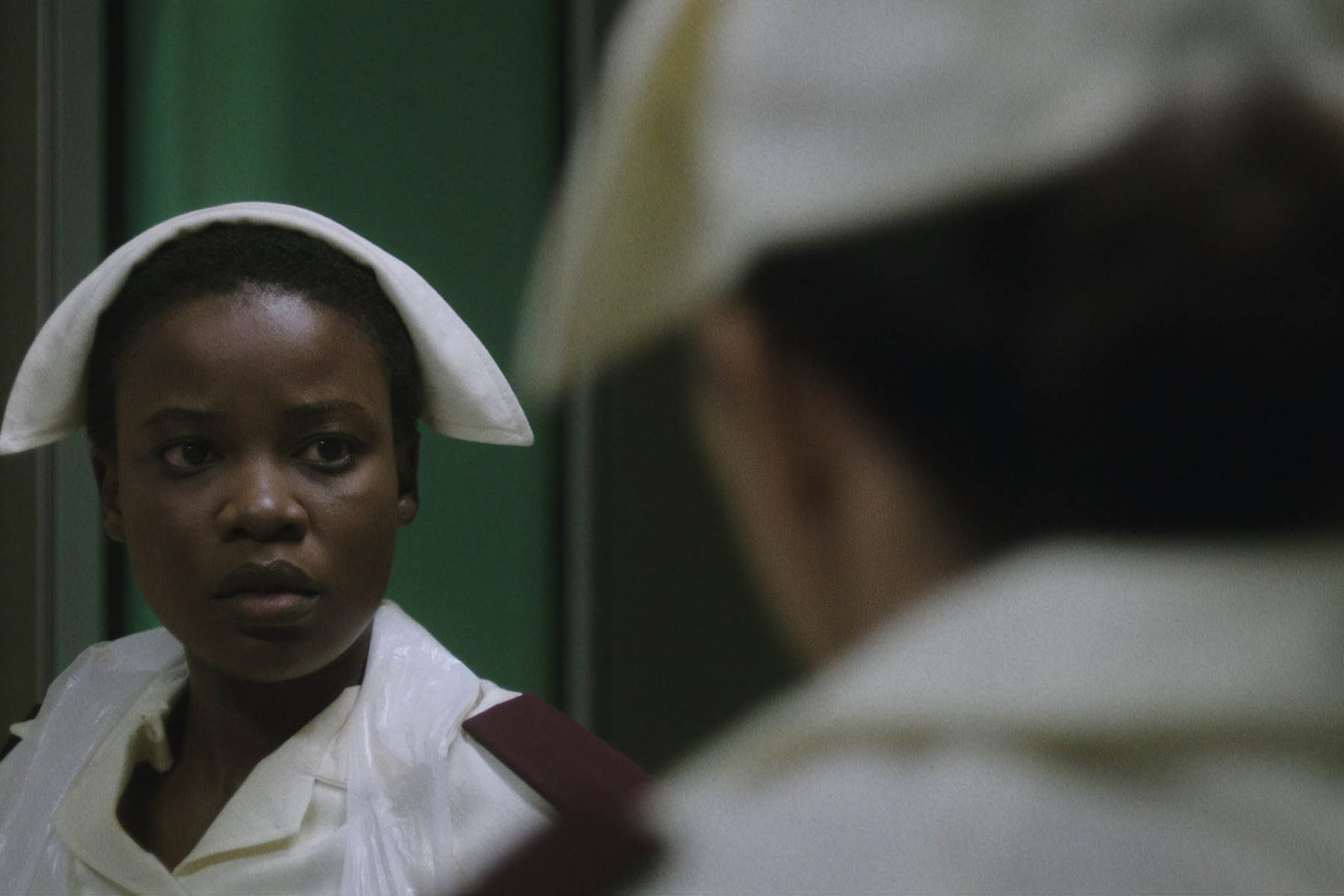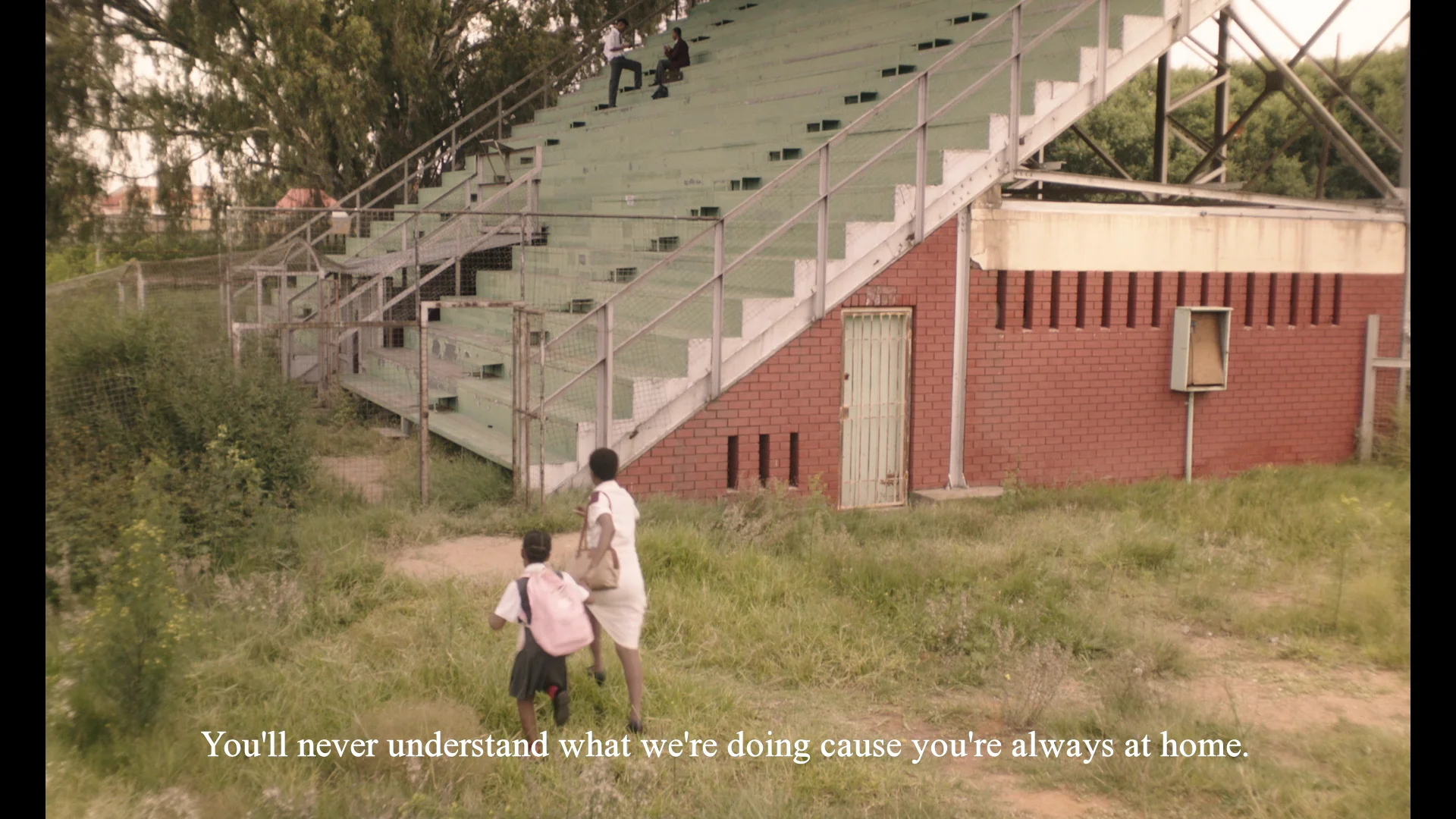
Phumi Morare: Colonialism took away our right to self-determination
Redakcia magazínu Pontón i autor tohto textu podporujú Kultúrny štrajk a aktivity Otvorenej Kultúry! Žiadame predovšetkým odborné a kompetentné riadenie rezortu kultúry a jednotlivých inštitúcií, zastavenie ideologicky motivovanej cenzúry a finančnú stabilizáciu sektora s dôrazom na zlepšenie finančného ohodnotenia pracujúcich a ich sociálneho zabezpečenia. Zároveň vyjadrujeme solidaritu so všetkými, ktorých sa dotýkajú deštruktívne kroky súčasnej politickej reprezentácie a neodborného kultúrneho manažmentu.
Phumi Morare, the South-African filmmaker and directress, presented her short films Why the Cattle Wait (2024) and When the Sun Sets (Lakutshon Ilanga, 2021) at the Ponrepo cinema of the National Film Archive in Prague earlier this year. When the Sun Sets won the so-called Student Oscar and was shortlisted for an Academy Award. In this interview, Morare reflects on the importance of telling the stories of ordinary women, amplifying non-white narratives, and the potential of historical revisionism in independent film.

 Three years ago, you won a Student Academy Award, a prize that often opens the door to the industry for filmmakers. Yet you still choose to finance your films mostly independently, on your own. Why is that?
Three years ago, you won a Student Academy Award, a prize that often opens the door to the industry for filmmakers. Yet you still choose to finance your films mostly independently, on your own. Why is that?
I can do the work that I want to do and do things in experimental new ways. I can push boundaries. As an independent filmmaker, you need the freedom to do that kind of thing. I have worked for a broadcaster over the past two years – because I needed the money, obviously. And I find that when I work in broadcast, I feel very constrained: I have all these ideas, and I can’t really express them in the work because of the strict criteria based on audience preferences.
Broadcasters don’t like taking risks. And I feel like this is what an independent filmmaker should be doing. If we just keep doing the same things, we won’t expand the cinema. We won’t teach the audience new things.
It’s very hard going the independent route because it takes a really long time to raise money. But right now, I feel it’s worth it.
You are known for recreating tiny, personal moments within long-lasting historical events and eras. Your debut short film Home explores forced adoptions in the US, a topic which is still taboo. Why did you choose to cover this subject?
Back at film school, I worked with a writer who was very interested in the subject. Of all the writers I interviewed, I was most interested in her story because it was the story of a woman who’s faced some kind of oppression and she has to rise above it. Those are the kind of stories that I’m interested in, showing women overcoming something that society has put on them. I read more about the history of forced adoptions and realized that a lot of people don’t actually know this stuff happened. I like history, looking at stories of ordinary people that aren’t well known. I also like revisionist history, imagining what might have happened differently. With Home, we imagined what could have happened differently if she had had the courage to fight back.
In your second short film When the Sun Sets, we follow the story of a nurse during the height of the anti-Apartheid protests in the Republic of South Africa. She only witnesses the events from her workplace, while caring for two brothers and ultimately must take physical action to protect her family. Your characters are often women seeking some kind of empowerment, which they gain through radical action. How intentional is this approach of yours, speaking of the fact that When the Sun Sets was inspired by your mother’s memories?
It’s intentional in a way but it’s also a subconscious thing that I’m working through myself. I’m quite a soft person, and when things anger me, sometimes I can’t react in the moment: it must build up inside me, and then I can react. It sort of shows my own personality as well, and my own journey of trying to stand up for myself that I was going through when I was writing those films.
My mother is like me, very soft and quiet. So, when I was thinking about my mother’s story, I just couldn’t imagine what would bring her to the point where she had to save her brother, how did she get there? It made me think about myself, and what would bring me to the point where I would just let myself loose.
In an interview with Blackfilm, you mentioned that while shooting When the Sun Sets, you came to realize that your parents’ generation has been largely silent about the fall of Apartheid – probably because they wanted to protect you. Doesn’t this approach make this chapter of history more of a taboo and less openly reflected upon?
The first people to see the film were my family. My mom said that she sort of blocked the situation out of her mind and moved on. Same with my uncle. But when we watched it as a family, they both said that it made them reflect on that time and my uncle appreciated that his sister had actually saved his life. He hadn’t really thought a lot about that. My mom said that she didn’t realise that she was so brave. So, I think by showing this film from the perspective of the younger generation, they can process what happened. I think they just haven’t had a chance to really process what happened under Apartheid.
For my generation, it was educational because our parents don’t talk about it. They’re just trying to move on. We’re trying to learn and understand. A lot of people from my generation and younger said that they watched the film with their mothers, aunts, grandmothers, and then it opened the opportunity for the elders to tell them what they have experienced. There isn’t a rejection of Apartheid – people didn’t have a chance to think about it.
I feel that the voice of the younger generations can push the narrative out of the white gaze that has dominated the retelling of historical events all over the world. We see the same thing happening in Israel just now. Do you feel the same?
Yes, although in South Africa, people have been trying to tell stories outside the white gaze for the last twenty years. In the last five years there has been resistance to telling stories about Apartheid because people felt tired of hearing them. They felt tired of hearing about trauma. Some filmmakers asked me: why are you telling another Apartheid story? But for me it wasn’t an Apartheid story. It was my family’s story.


I know you consider your film a personal, not political.
When people saw it, they realized that it’s just an untold story of an ordinary family whereas a lot of the Apartheid stories that we are told now are those of iconic figures.
The film also brings up a subject of social injustice from a female perspective. The protagonist in When the Sun Sets is targeted by her brother because “she doesn’t even get out of the house”, ignoring the forms of care she has to provide for the household. There is a strong sense of how patriarchal social construction can rot within the Apartheid politics. Do you feel that the role of women during this period is being explored often enough and properly?
I think there was a good representation of women activists, but I think the people who were forgotten were the women who stayed at home, women who were keeping the family alive, and kept the society running. Those women were forgotten because their husbands or brothers were fighting for freedom, and that’s the story I was interested in. What was everyone else doing and how were they contributing even if they weren’t fighting? I grew up in a family of women, and my grandmother would always tell me her stories. I kept asking myself: why am I not seeing that story told anywhere? The female social activists were certainly represented but not the ordinary women.
You often place your female characters in ambivalent, “just existing” roles. It made me think of Claire Denis and her early works such as Chocolat where she confronts her postcolonial thinking by recreating her childhood memories from living in Cameroon. Am I overinterpreting, or is there perhaps a connection to Denis’ work in your own?
Yeah, her work does influence me. Seeing the women’s and also the child’s perspective of what’s really going on is really interesting.
The use of archival material in When the Sun Sets is outstanding. How do you approach the “digging” process and in what ways does it enrich your work?
It was a very long process to find that archival material but also educational for me. I enjoyed it because the more I was digging through material, the more I was learning and the more it was enriching the story. I was researching the archival materials while I was writing and also during post-production. By the time you get there, you usually have learnt everything you need to learn but I was still learning more about history and that was enriching. It also taught me how to look for archival material as well: some of the traditional sources were extremely expensive, so I had to find alternative ways: universities, non-profit organizations etc.
You often mention that you approach cinematography through a Black female gaze. In one interview, you described that your editor had to confront his own form of gaze as a non-Black person.
I kept telling my crew that this must be shot from the perspective of a Black woman in South Africa and our filming and editing is always from her perspective. My editor would sometimes edit a scene that balances the perspective between the sister and the brother but then he would have to step back and ask: is this still her perspective? He’d have to put aside some of what he thought should be seen in order to keep telling the story only from her perspective. Sometimes we would sit together and realise that her perspective was not being seen enough. I really enjoyed working with him because he was so open to doing that and he was open to stepping out of his male gaze for each scene.
We also discussed how to show violence on camera. It’s tricky because people don’t like seeing violence against POC people, so we discussed how to shoot the scene in a form that it’s not about what someone else is doing to her but about the heroine being resilient, trying to stand up for herself.
Spirituality is a powerful presence in your films. While in When the Sun Sets the protagonist turns to God while searching for a missing brother, the plot of your latest piece Why the Cattle Wait is rooted in South African folklore. What role do spirituality and religion play in your life? How deeply do they influence your creative work?
I had a Christian upbringing, but I’ve also been grappling with how African spirituality has been considered bad or evil within the Christian context. I tried to bring it back into how I see the world and how I deal with spirituality because a lot of traditional African spirituality is actually really beautiful.
I’m learning more about it, and Why the Cattle Wait is exploring traditional African spirituality. In When the Sun Sets, I am showing the way my mother and grandmother use spirituality in their lives. When my mom tried to save her brother, she was praying to God to help her.
So it’s still personal but it centers on the women whose lives these stories are based on…
Yes, When the Sun Sets is about those women and the way I’ve watched them as I was growing up whereas Why the Cattle Wait follows my own exploration of traditional African spirituality and me grappling with that. Because when you grow up Christian in South Africa, you are told that you shouldn’t even think about it or interact with it because it’s evil.
Why the Cattle Wait is far more lyrical, poetic. It follows a story of an anthropomorphized goddess on her way to destroy the world before it can witness terrible, dark events, confronting her devotion when she meets a human she once fell in love with. Where did the idea for this film originate?
At that time, I wanted to write a love story because of a painful love incident that I had experienced. At that time, I was reading these folk tales and the story that struck me the most was this female goddess who had a turbulent relationship with humans. As I thought about this relationship that she had with these humans, it made me think about my own situation with the person that I loved. I thought about this doomed love story between the mother goddess and humans, and what humans are doing to the world or the destruction we bring upon each other.
Credo Muto, the mythologist I spoke to the shaman about says that the mother goddess comes back and does this Noah’s Ark kind of erasure, when she puts an end to everything and starts again. At the same time, I was thinking about colonization and colonialism. I considered which events in history would have caused a mother goddess to say, OK, it’s time to take this down. Colonialism was definitely one of them.
When did the idea of using colonialism as a symbol for the end of the world first pop into your mind?
From the native lands, when we think about the impact of colonization, we think that it destroyed our culture, our families. Maybe it’s exaggerating to compare it to the end of the world, but it was almost the end of our culture and self-determination. It changed the course of history. Many South African native artists and filmmakers today are imagining the parallel universe of Africa continuing its path without the effect of the colonizer. Where would we be today? How would we be thriving? I was interested in exploring that.
Reimagining a different past from a postcolonial perspective evokes themes that Afrofuturist thinkers are researching in contemporary cultural studies. Why the Cattle Wait also brings up some ecofeminist messages.
I don’t think my intentions in writing were directly ecofeminist but it’s something that is important to me. The way in which native South Africans historically were in harmony with nature – and that’s completely gone. Colonization brought destruction of that natural environment, of that harmony between people and the natural environment.
Proofreading : Zuzana Hrivňáková
Pictures:
When the Sun Sets (dir. Phumi Morare)
Redakcia magazínu Pontón i autor tohto textu podporujú Kultúrny štrajk a aktivity Otvorenej Kultúry! Žiadame predovšetkým odborné a kompetentné riadenie rezortu kultúry a jednotlivých inštitúcií, zastavenie ideologicky motivovanej cenzúry a finančnú stabilizáciu sektora s dôrazom na zlepšenie finančného ohodnotenia pracujúcich a ich sociálneho zabezpečenia. Zároveň vyjadrujeme solidaritu so všetkými, ktorých sa dotýkajú deštruktívne kroky súčasnej politickej reprezentácie a neodborného kultúrneho manažmentu.
Phumi Morare, the South-African filmmaker and directress, presented her short films Why the Cattle Wait (2024) and When the Sun Sets (Lakutshon Ilanga, 2021) at the Ponrepo cinema of the National Film Archive in Prague earlier this year. When the Sun Sets won the so-called Student Oscar and was shortlisted for an Academy Award. In this interview, Morare reflects on the importance of telling the stories of ordinary women, amplifying non-white narratives, and the potential of historical revisionism in independent film.

